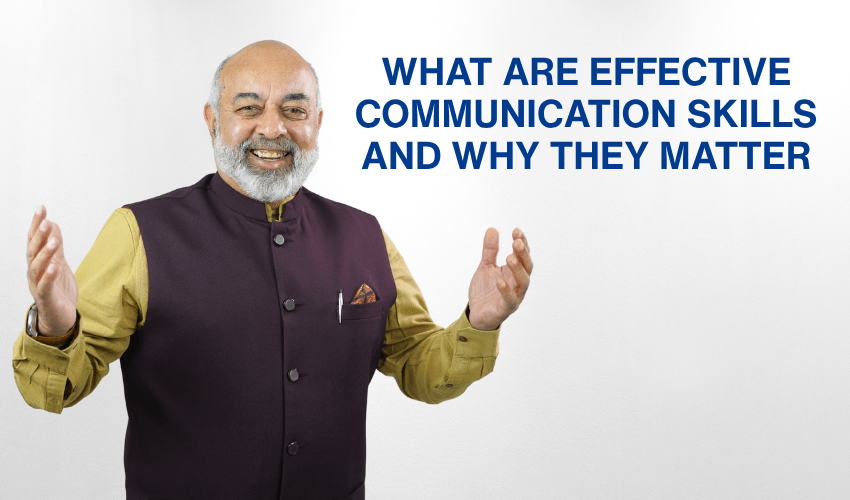
If there’s one ability that separates ordinary professionals from exceptional leaders,
it is effective communication skills. Over the years, I’ve seen brilliant minds with
great ideas fall short,not because they lacked knowledge, but because they couldn’t
convey their thoughts with clarity, confidence, and conviction.
I remember mentoring a young manager who struggled to rally his team despite his
technical brilliance. His presentations were factually correct but uninspiring. After
working on simple but powerful techniques for effective communication,like pausing for
impact, structuring his thoughts, and listening before responding,he transformed into a
leader people wanted to follow. That is the power of communication done right.
What Are Effective Communication Skills?
At its core, effective communication is about ensuring your message is not just delivered
but also understood in the way you intended. It combines verbal, nonverbal, and listening
abilities.
Some key skills for effective communication include:
- Active listening: Truly hearing what the other person means, not just what they say.
- Clarity: Expressing complex ideas in simple, relatable terms.
- Empathy: Connecting to emotions, not just words.
- Feedback: Being open to both giving and receiving.
Think of it as a bridge,built strong enough to carry not just words, but meaning, trust, and intent.
The Importance of Effective Communication
Why does this matter so much? Because every relationship,whether personal or professional,thrives or fails based on communication.
- In leadership, the ability to align teams to a vision depends less on PowerPoint slides and more on words spoken with conviction.
- In business, closing a deal is often less about numbers and more about how well you establish trust.
- In life, misunderstandings almost always stem from what wasn’t said or wasn’t understood.
The importance of effective communication cannot be overstated: it determines influence, impact, and ultimately, outcomes.
The Bhagavad Gita offers a timeless leadership lesson here. When Arjuna was paralyzed with doubt, Krishna didn’t give him orders. He guided him through dialogue, questions, and metaphors,showing that true leaders communicate to empower, not to impose.
Techniques for Effective Communication
Here are some practical ways you can sharpen your communication today:
- The Pause Principle – Before responding, pause. It shows thoughtfulness and often prevents miscommunication.
- Storytelling – Facts tell, stories sell. Use stories to make ideas stick.
- Structure Your Message – Beginning, middle, end. Never overwhelm with scattered points.
- Mirror and Match – Adapt your tone and body language to build rapport.
- strong>Feedback Loop – Ask questions to ensure your message has landed. Good leaders speak last. By listening to all perspectives before voicing their own, they create space for trust, openness, and collaboration.
These techniques for effective communication are simple, but consistently applied, they create profound impact.
Examples of Effective Communication in Action
- In Teams: A leader who summarizes everyone’s viewpoints before making a decision shows respect and builds consensus.
- In Sales: A consultant who listens more than he speaks builds trust faster than one who oversells.
- In Personal Life: A parent who explains why instead of just saying no creates deeper understanding.
These are simple but powerful examples of effective communication that shift dynamics from
conflict to collaboration.
I once worked with a startup founder who couldn’t get investor buy-in. By reframing his
pitch into a narrative that highlighted not just features, but the human impact of his
solution, his funding round closed within weeks. Again, communication,not just content,made
the difference.
Building the Habit of Communication Mastery
Like any skill, communication improves with practice. One way I start my own day is through a disciplined routine,reflection, writing, visualization, and one intentional conversation. This 4-step morning practice sets the tone for a winning day, and I encourage every leader to build rituals that keep their communication intentional and sharp.
Final Word
So, what are effective communication skills and why do they matter? They are the foundation
of trust, influence, and leadership. The importance of effective communication cannot be
ignored if you aspire to lead, inspire, and transform.
Invest in mastering these skills for effective communication, apply the techniques for
effective communication, and learn from the examples of effective communication around you.
Because at the end of the day, your success is not determined by what you know,but by how
powerfully you share it.
About Coach Girish Konkar
Cdr. Girish Konkar (Retd.) is a former Indian Navy Submarine Commander turned Leadership & Transformation Coach with over 40 years of experience across military and corporate arenas. As CEO of Beyond Horizons, he blends experiential tools like NLP, Psych-K®, etc. with strategic insight to empower authentic, resilient leaders. He now dedicates his journey to guiding professionals and organizations toward purposeful leadership, growth, and lasting impact.





